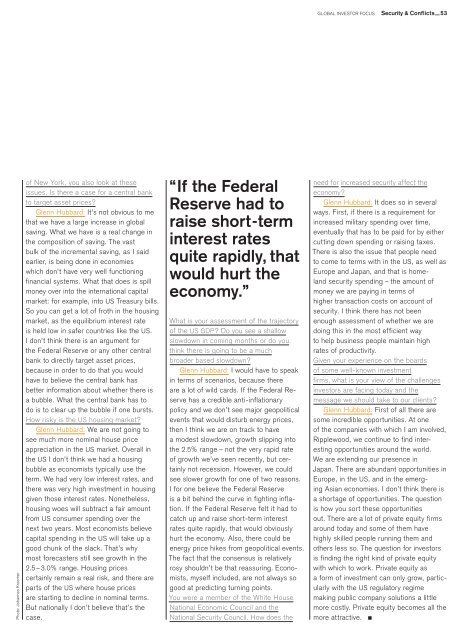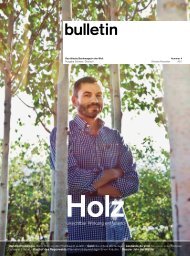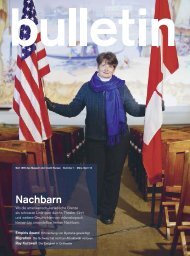Security & Conflicts
Global Investor Focus, 02/2006 Credit Suisse
Global Investor Focus, 02/2006
Credit Suisse
Create successful ePaper yourself
Turn your PDF publications into a flip-book with our unique Google optimized e-Paper software.
GLOBAL INVESTOR FOCUS <strong>Security</strong> & <strong>Conflicts</strong> — 53<br />
Photo: Johannes Kroemer<br />
of New York, you also look at these<br />
issues. Is there a case for a central bank<br />
to target asset prices?<br />
Glenn Hubbard: It’s not obvious to me<br />
that we have a large increase in global<br />
saving. What we have is a real change in<br />
the composition of saving. The vast<br />
bulk of the incremental saving, as I said<br />
earlier, is being done in economies<br />
which don’t have very well functioning<br />
financial systems. What that does is spill<br />
money over into the international capital<br />
market: for example, into US Treasury bills.<br />
So you can get a lot of froth in the housing<br />
market, as the equilibrium interest rate<br />
is held low in safer countries like the US.<br />
I don’t think there is an argument for<br />
the Federal Reserve or any other central<br />
bank to directly target asset prices,<br />
because in order to do that you would<br />
have to believe the central bank has<br />
better information about whether there is<br />
a bubble. What the central bank has to<br />
do is to clear up the bubble if one bursts.<br />
How risky is the US housing market?<br />
Glenn Hubbard: We are not going to<br />
see much more nominal house price<br />
appreciation in the US market. Overall in<br />
the US I don’t think we had a housing<br />
bubble as economists typically use the<br />
term. We had very low interest rates, and<br />
there was very high investment in housing<br />
given those interest rates. Nonetheless,<br />
housing woes will subtract a fair amount<br />
from US consumer spending over the<br />
next two years. Most economists believe<br />
capital spending in the US will take up a<br />
good chunk of the slack. That’s why<br />
most forecasters still see growth in the<br />
2.5 – 3.0% range. Housing prices<br />
certainly remain a real risk, and there are<br />
parts of the US where house prices<br />
are starting to decline in nominal terms.<br />
But nationally I don’t believe that’s the<br />
case.<br />
“If the Federal<br />
Reserve had to<br />
raise short-term<br />
interest rates<br />
quite rapidly, that<br />
would hurt the<br />
economy.”<br />
What is your assessment of the trajectory<br />
of the US GDP? Do you see a shallow<br />
slowdown in coming months or do you<br />
think there is going to be a much<br />
broader based slowdown?<br />
Glenn Hubbard: I would have to speak<br />
in terms of scenarios, because there<br />
are a lot of wild cards. If the Federal Reserve<br />
has a credible anti-inflationary<br />
policy and we don’t see major geopolitical<br />
events that would disturb energy prices,<br />
then I think we are on track to have<br />
a modest slowdown, growth slipping into<br />
the 2.5% range – not the very rapid rate<br />
of growth we’ve seen recently, but certainly<br />
not recession. However, we could<br />
see slower growth for one of two reasons.<br />
I for one believe the Federal Reserve<br />
is a bit behind the curve in fighting inflation.<br />
If the Federal Reserve felt it had to<br />
catch up and raise short-term interest<br />
rates quite rapidly, that would obviously<br />
hurt the economy. Also, there could be<br />
energy price hikes from geopolitical events.<br />
The fact that the consensus is relatively<br />
rosy shouldn’t be that reassuring. Economists,<br />
myself included, are not always so<br />
good at predicting turning points.<br />
You were a member of the White House<br />
National Economic Council and the<br />
National <strong>Security</strong> Council. How does the<br />
need for increased security affect the<br />
economy?<br />
Glenn Hubbard: It does so in several<br />
ways. First, if there is a requirement for<br />
increased military spending over time,<br />
eventually that has to be paid for by either<br />
cutting down spending or raising taxes.<br />
There is also the issue that people need<br />
to come to terms with in the US, as well as<br />
Europe and Japan, and that is homeland<br />
security spending – the amount of<br />
money we are paying in terms of<br />
higher transaction costs on account of<br />
security. I think there has not been<br />
enough assessment of whether we are<br />
doing this in the most efficient way<br />
to help business people maintain high<br />
rates of productivity.<br />
Given your experience on the boards<br />
of some well-known investment<br />
firms, what is your view of the challenges<br />
investors are facing today and the<br />
message we should take to our clients?<br />
Glenn Hubbard: First of all there are<br />
some incredible opportunities. At one<br />
of the companies with which I am involved,<br />
Ripplewood, we continue to find interesting<br />
opportunities around the world.<br />
We are extending our presence in<br />
Japan. There are abundant opportunities in<br />
Europe, in the US, and in the emerging<br />
Asian economies. I don’t think there is<br />
a shortage of opportunities. The question<br />
is how you sort these opportunities<br />
out. There are a lot of private equity firms<br />
around today and some of them have<br />
highly skilled people running them and<br />
others less so. The question for investors<br />
is finding the right kind of private equity<br />
with which to work. Private equity as<br />
a form of investment can only grow, particularly<br />
with the US regulatory regime<br />
making public company solutions a little<br />
more costly. Private equity becomes all the<br />
more attractive.

















